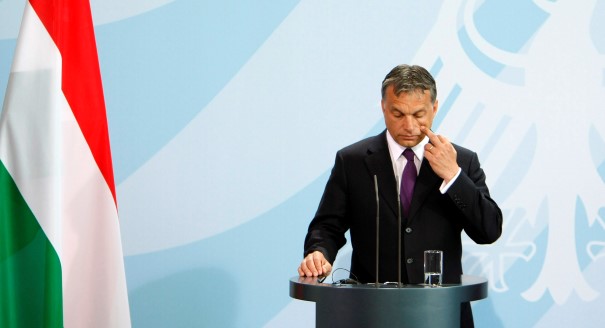Judy Dempsey
{
"authors": [
"Judy Dempsey"
],
"type": "commentary",
"blog": "Strategic Europe",
"centerAffiliationAll": "",
"centers": [
"Carnegie Endowment for International Peace",
"Carnegie Europe"
],
"collections": [],
"englishNewsletterAll": "",
"nonEnglishNewsletterAll": "",
"primaryCenter": "Carnegie Europe",
"programAffiliation": "",
"programs": [],
"projects": [],
"regions": [
"Europe"
],
"topics": [
"EU"
]
}
Source: Getty
Hungary’s New Constitution: Time to Sanction Orbán?
As the government in Budapest introduces far-reaching constitutional amendments, it’s time for European leaders to take a stand and defend the EU’s values and principles.
János Áder is the president of Hungary. As such, his power is rather limited. But one power he does enjoy is the right to sign constitutional amendments into law.
He now has quite a batch of them on his desk, following last week’s vote by the Hungarian parliament to introduce sweeping changes to the constitution. Prime Minister Viktor Orbán’s conservative Fidesz party, which commands a two-thirds majority in the parliament, initiated the revision. It is the fourth amendment to Hungary’s new basic law, which came into force only fourteen months ago.
One change involves restricting election campaigns to the publicly run media. It will be interesting to see how Fidesz will enforce this measure, especially across the Internet and social media.
Another is a requirement for students who have received state grants to stay and work in Hungary for a certain period of time after graduating, or pay back the cost of their tuition to the state.
Romania introduced a similar a law during the 1980s. The country’s former dictator, president Nicolae Ceauşescu, believed it would deter talent from leaving the country.
As for family values, Fidesz wants preference to be given to traditional relationships. It believes families should be based on (heterosexual) marriage and the parent-child relationship. Same-sex partnerships are not considered equally valid.
People caught sleeping on the streets will be either fined or imprisoned. Clearly, this government believes that homelessness and poverty can be banned.
In a joint statement, the European Union and the Council of Europe have criticized the revisions. “These amendments raise concerns with the respect to the principle of the rule of law.” Before last week’s vote, Orbán had already accused the EU of interfering in Hungary’s domestic affairs.
Gergely Gulyás, the deputy leader of the Fidesz parliamentary group, told the right-wing daily Magyar Nemzet that the government saw no reason to put off the vote despite “domestic and international kerfuffle. It’s natural for the governing majority to make use of the authority it received in democratic elections.”
When Fidesz was elected nearly three years ago, Orbán, who served a first term as prime minister from 1998 to 2002, vowed to make a clean break with Hungary’s Communist past.
He was right to single out the former socialist government for pervasive corruption, cronyism, and lying about the true state of the economy. He was also right to criticize the lack of transparency over the use of the EU’s structural funds.
Yet Orbán seems intent on pursuing the politics of revenge, even at the price of undermining democracy. He has replaced a number of top officials appointed by earlier governments, including judges and the head of the central bank, with his own political allies.
But it is Orbán’s use of his two-thirds majority, which enables Fidesz to push through changes to the constitution, that raises the most concerns within the EU. Orbán’s attempts to reassure Brussels that he is dedicated to European norms and rules sound increasingly hollow.
“I should like to assure you that this commitment has been and is going to be reflected throughout the process of adopting the modifications to the fundamental law,” Orbán wrote last week in a letter to European Commission President José Manuel Barroso. “I am convinced that I can rely on your personal support and on the cooperation of the European Commission,” he added.
Barroso’s room for maneuver is limited. The EU treaties allow for political sanctions—such as suspension of voting rights—against a member state that does not keep to democratic principles. But this would require strong support from national governments, which have so far been hesitant to confront one of their own.
Yet with the latest amendments to Hungary’s constitution, surely it is time for EU leaders to challenge Orbán publicly when they meet this week. Either the EU takes a stand and defends its values and principles in a much more robust way, or it will suffer the consequences of seeing those values eroded.
Civil society and opposition parties must also stand up for these values. Boycotting last week’s vote on the constitutional changes, as most of Hungary’s opposition did, is not a solution.
László Sólyom, a former president who was head of the Hungarian constitutional court from 1990 to 1998, argued in an open letter last week that there was one last chance to stop the changes. President Áder, Sólyom said, should refuse to sign the constitutional amendments into law.
The idea was picked up by Origo, an independent news website. It ran an article entitled “Don’t sign it, János!”
The president isn’t likely to withhold his signature, however. Not only is it questionable whether he is allowed to do this; Áder was also nominated by Fidesz, the party he would now have to defy.
European leaders need to understand that they cannot escape their responsibility for what happens in Hungary. It is time to take a stance.
About the Author

Nonresident Senior Fellow, Carnegie Europe
Dempsey is a nonresident senior fellow at Carnegie Europe
- Europe Needs to Hear What America is SayingCommentary
- Babiš’s Victory in Czechia Is Not a Turning Point for European PopulistsCommentary
Judy Dempsey
Recent Work
More Work from Strategic Europe
- Taking the Pulse: Can European Defense Survive the Death of FCAS?Commentary
France and Germany’s failure to agree on the Future Combat Air System (FCAS) raises questions about European defense. Amid industrial rivalries and competing strategic cultures, what does the future of European military industrial projects look like?
Rym Momtaz, ed.
- Macron Makes France a Great Middle PowerCommentary
France has stopped clinging to notions of being a great power and is embracing the middle power moment. But Emmanuel Macron has his work cut out if he is to secure his country’s global standing before his term in office ends.
Rym Momtaz
- How Europe Can Survive the AI Labor TransitionCommentary
Integrating AI into the workplace will increase job insecurity, fundamentally reshaping labor markets. To anticipate and manage this transition, the EU must build public trust, provide training infrastructures, and establish social protections.
Amanda Coakley
- Can Europe Still Matter in Syria?Commentary
Europe’s interests in Syria extend beyond migration management, yet the EU trails behind other players in the country’s post-Assad reconstruction. To boost its influence in Damascus, the union must upgrade its commitment to ensuring regional stability.
Bianka Speidl, Hanga Horváth-Sántha
- Taking the Pulse: Can the EU Attract Foreign Investment and Reduce Dependencies?Commentary
EU member states clash over how to boost the union’s competitiveness: Some want to favor European industries in public procurement, while others worry this could deter foreign investment. So, can the EU simultaneously attract global capital and reduce dependencies?
Rym Momtaz, ed.









